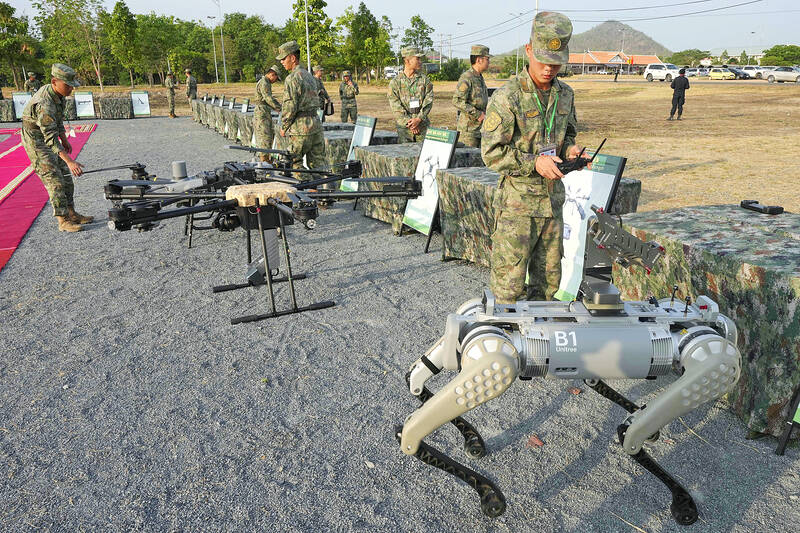China’s military yesterday showed off its machine-gun equipped robot battle “dogs” at the start of its biggest ever drills with Cambodian forces.
More than 2,000 troops, including 760 Chinese military personnel, are taking part in the drills at a remote training center in central Kampong Chhnang Province and at sea off Preah Sihanouk Province.
The 15-day exercise, dubbed Golden Dragon, also involves 14 warships — three from China — two helicopters and 69 armored vehicles and tanks, and includes live-fire, anti-terrorism and humanitarian rescue drills.

Photo: AP
The hardware on show included the so-called “robodogs” — remote-controlled four-legged robots with automatic rifles mounted on their backs.
Handlers kept the dogs of war on the leash, demonstrating only their walking capabilities to watching journalists and top brass — not their shooting skills.
Opening the exercises, Cambodian armed forces commander-in-chief Vong Pisen said that they would “enhance the capabilities” of the two armies in the fight against terrorism.
Vong Pisen said that Cambodia would never allow a foreign military base on its territory, echoing previous assertions by Cambodian leaders.
After Cambodia dismantled facilities at Ream naval base near the Cambodian port city of Sihanoukville, built partly with US funding and having played host to US military exercises, China began funding its renovation.
Two Chinese warships docked at Ream in December last year for the first time after work began to expand the base.
Washington says that Ream could give Beijing a key strategic position on Gulf of Thailand near the disputed South China Sea.
Earlier this week, Cambodian army spokesman Thong Solimo told reporters that the exercises were biggest ever of their kind and China would cover the cost.

‘EYE FOR AN EYE’: Two of the men were shot by a male relative of the victims, whose families turned down the opportunity to offer them amnesty, the Supreme Court said Four men were yesterday publicly executed in Afghanistan, the Supreme Court said, the highest number of executions to be carried out in one day since the Taliban’s return to power. The executions in three separate provinces brought to 10 the number of men publicly put to death since 2021, according to an Agence France-Presse tally. Public executions were common during the Taliban’s first rule from 1996 to 2001, with most of them carried out publicly in sports stadiums. Two men were shot around six or seven times by a male relative of the victims in front of spectators in Qala-i-Naw, the center

Incumbent Ecuadoran President Daniel Noboa on Sunday claimed a runaway victory in the nation’s presidential election, after voters endorsed the young leader’s “iron fist” approach to rampant cartel violence. With more than 90 percent of the votes counted, the National Election Council said Noboa had an unassailable 12-point lead over his leftist rival Luisa Gonzalez. Official results showed Noboa with 56 percent of the vote, against Gonzalez’s 44 percent — a far bigger winning margin than expected after a virtual tie in the first round. Speaking to jubilant supporters in his hometown of Olon, the 37-year-old president claimed a “historic victory.” “A huge hug

Canadian Prime Minister Mark Carney is leaning into his banking background as his country fights a trade war with the US, but his financial ties have also made him a target for conspiracy theories. Incorporating tropes familiar to followers of the far-right QAnon movement, conspiratorial social media posts about the Liberal leader have surged ahead of the country’s April 28 election. Posts range from false claims he recited a “satanic chant” at a campaign event to artificial intelligence (AI)-generated images of him in a pool with convicted sex offender Jeffrey Epstein. “He’s the ideal person to be targeted here, for sure, due to

DISPUTE: Beijing seeks global support against Trump’s tariffs, but many governments remain hesitant to align, including India, ASEAN countries and Australia China is reaching out to other nations as the US layers on more tariffs, in what appears to be an attempt by Beijing to form a united front to compel Washington to retreat. Days into the effort, it is meeting only partial success from countries unwilling to ally with the main target of US President Donald Trump’s trade war. Facing the cratering of global markets, Trump on Wednesday backed off his tariffs on most nations for 90 days, saying countries were lining up to negotiate more favorable conditions. China has refused to seek talks, saying the US was insincere and that it